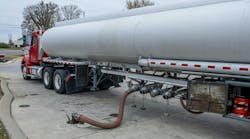WHAT IS ULSD?
In North America, ULSD, or ultra-low-sulfur diesel, refers to diesel fuel with a maximum sulfur content of 15 parts per million (ppm).
HOW WILL DIESEL FUEL PROPERTIES, OTHER THAN SULFUR, CHANGE?
Changes will occur in terms of lubricity, energy content and cetane number.
Lubricity
The processing required to reduce sulfur to 15 ppm also removes naturally-occurring lubricating agents. To manage this change, the American Society for Testing and Materials (ASTM) adopted the lubricity specification defined in ASTM D975 for all diesel fuels. The standard went into effect January 1, 2005.
Energy content
In general, the processing required to reduce sulfur to 15 ppm also reduces the aromatics content and density of diesel fuel, resulting in a reduction in energy content (BTU/gal). A 1% reduction is expected, which may affect mpg.
Cetane number
In general, the processing required to reduce sulfur to 15 ppm also reduces the aromatics content resulting in an increase to the cetane number.
WHERE CAN I PURCHASE ULSD FUEL?
Although ULSD will be the dominant highway diesel fuel produced, EPA does not require service stations and truck stops to sell it. So it's possible that ULSD might not be available initially at every service station or truck stop.
HOW WILL I KNOW WHICH PUMPS ARE DISPENSING ULSD?
Federal regulations require that all diesel fuel pumps be labeled to specify the type of fuel dispensed (except in California, where all diesel must be ULSD by June 1, 2006). Similar instrument panel and fuel inlet/fill cap labeling is being mandated for 2007 and later model year vehicles that require ULSD.
WILL ULSD HAVE A DIFFERENT COLOR?
The natural color of diesel fuels has traditionally varied from colorless to amber. As refinery processing of the diesel fuel increases to remove sulfur, the color tends to get lighter and the diesel can change color. When it changes color the diesel is typically light in tone and can be green, orange or pink.
WILL I BE ABLE TO FIND LOW-SULFUR DIESEL FUEL FOR OLDER VEHICLES?
Beginning with model-year 2007, diesel-powered highway vehicles must use ULSD. Owners of 2006 and earlier model-year diesel vehicles may use ULSD or low-sulfur diesel during the transition period. But starting Dec. 1, 2010, only ULSD will be available for on-highway use.
CAN I BLEND KEROSENE WITH ULSD?
Yes, but only ultra-low-sulfur kerosene (No. 1 diesel with no more than 15 ppm sulfur). There are many kerosene formulations on the market, so be careful to choose one with a maximum of 15 ppm sulfur. Blend rates will remain the same as with low-sulfur diesel fuel.
WILL ULSD BE MORE EXPENSIVE?
Probably. No one can predict with certainty the price of ULSD fuel at the pump. Many factors affect the consumer price of fuels, including the price of crude oil on the global market, geopolitical, weather, transportation and economic events, as well as supply and demand.
HOW WILL IT AFFECT THE POWER AND FUEL ECONOMY OF EXISTING EQUIPMENT?
Under typical operating conditions, there should be no noticeable impact on overall power using ULSD fuel. Fuel economy may be reduced slightly because the process that removes sulfur also can reduce the energy content of the fuel.
WILL ULSD AFFECT PERFORMANCE?
Engine and vehicle manufacturers expect ULSD to be fully compatible with the existing fleet, including 2006 and earlier model year vehicles. In some instances, however, the introduction of ULSD fuel to older vehicles may affect fuel system components or loosen deposits in fuel tanks. As part of a good maintenance program, owners and operators of existing trucks and buses are encouraged to monitor their diesel-powered vehicles closely for potential fuel system leaks or premature fuel filter plugging during the changeover to ULSD fuel.
WHAT IF I USE CURRENT FUEL IN ‘07 TRUCKS?
Diesel-powered engines for 2007 and later model year highway vehicles are designed to operate only with ULSD fuel. Using anything else will reduce the efficiency and durability of engines, permanently damage advanced emissions control systems, reduce fuel economy and possibly prevent the vehicles from running at all. Manufacturer warranties are likely to be voided by improper fuel use. Also, burning low-sulfur diesel in 2007 and later model-year diesel-powered trucks and buses is illegal and punishable with civil penalties.
WILL I NEED TO USE A FUEL ADDITIVE?
Like low-sulfur diesel, ULSD fuel requires good lubricity and corrosion inhibitors to prevent unacceptable engine wear. As necessary, additives to increase lubricity and to inhibit corrosion will be added to ULSD prior to its retail sale. With these additives, ULSD is expected to perform as well as low-sulfur diesel.
Sources: Diesel Technology Forum, Chevron, U.S. EPA, Clean Diesel Fuel Alliance.


